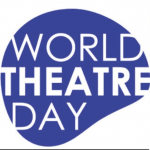
Here is a response to the question submitted to CPNN by Kiki Chauvin.
The actor lives between two worlds, one of which is his proper existence and the other, the world of fiction where he takes on the role of his character. He seems to have one foot on each of them while his head collects, combines, mixes, synthesizes and puts together the emotions that are translated and expressed by body and voice.
We get it directly, it is “in our face” with no escape possible! The richness of this mixture “reality/fiction” allows the artist to enter into us through hidden doors.
Using texts with humor and irony, the actor passes messages to which our minds would otherwise be deaf! He affects us, challenges us, plays with us, provokes us, making our attention an accomplice of what he has to say.
The direct contact and proximity, sometimes intimate, between stage and audience send us messages that we hear, questions that provoke us to transferring images to our daily experience, our reality, to “real life”!
Thus we are pushed and shaken from calm to storm, from injustice to anger, from hatred to solidarity, from indifference to empathy in the face of violence.
Actors are in the public service. They are “Public Friends Number One!” They are chroniclers, “troublemakers,” breakers of habit, forcing us to think things through.
The culture of peace needs the oxygen of this youthful spirit! , I believe that art in general, with its playfulness, has the power to awaken us. It is an excellent support to the promotion of the Culture of Peace.
I love the theater, it is a space of freedom where actors can transmit an energy drawn from the conviction of what they say.
We hear, receive, understand for a digestion that may be immediate and /or delayed. Some part is absorbed immediately, but the rest we take home with us. . . . and that is where the seeds of consciousness begin to germinate into the Culture of Peace.
Here are CPNN articles pertaining to this question:
Philippines: Theater, a tool for international understanding
Mexico, Los Cabos, Baja California Sur: Theater show celebrated on Theater Day
México, Los Cabos, Baja California Sur: Con muestra de trabajo escénico se celebró el Día del Teatro
From the “jungle” to the theater, refugees replay their exile to Europe
De la “jungle” au théâtre, des réfugiés rejouent leur exil vers l’Europe
Interview with Ms. Cecile Guidote-Alvarez Director, UNESCO DREAM Center, Philippines
Shades, an Anti-war Play, Opens to Rave Reviews in Los Angeles